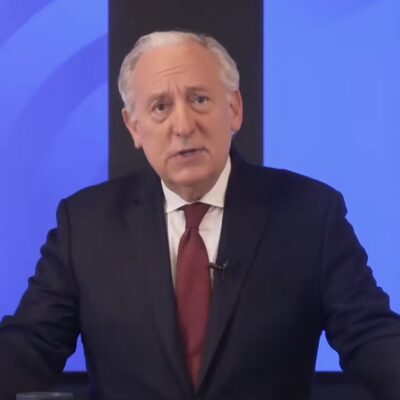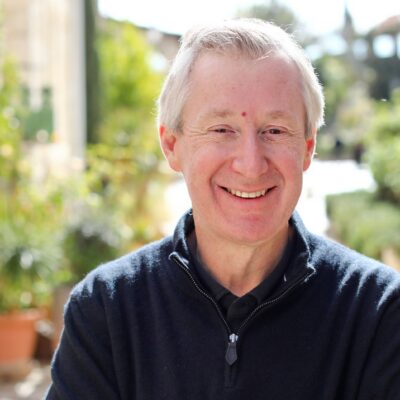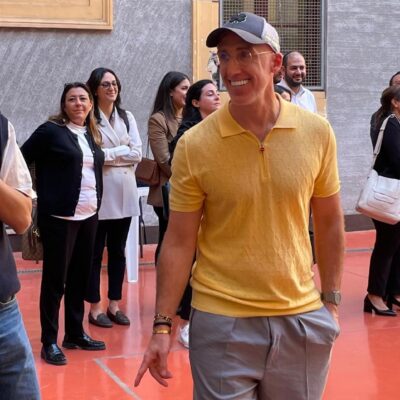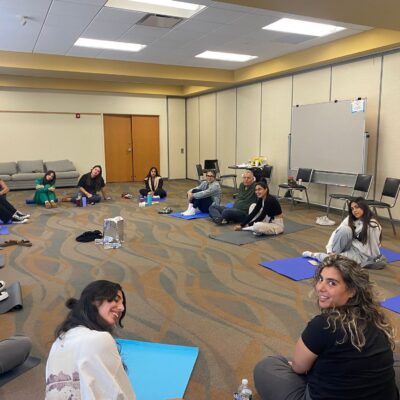SCOOP
After initial agreement collapsed, World Zionist Congress reaches new tentative power-sharing deal
New agreement would see return of Yaakov Hagoel as chair of the World Zionist Organization, followed by a representative from Yesh Atid; Mizrachi's Rabbi Doron Perez would take a different senior role
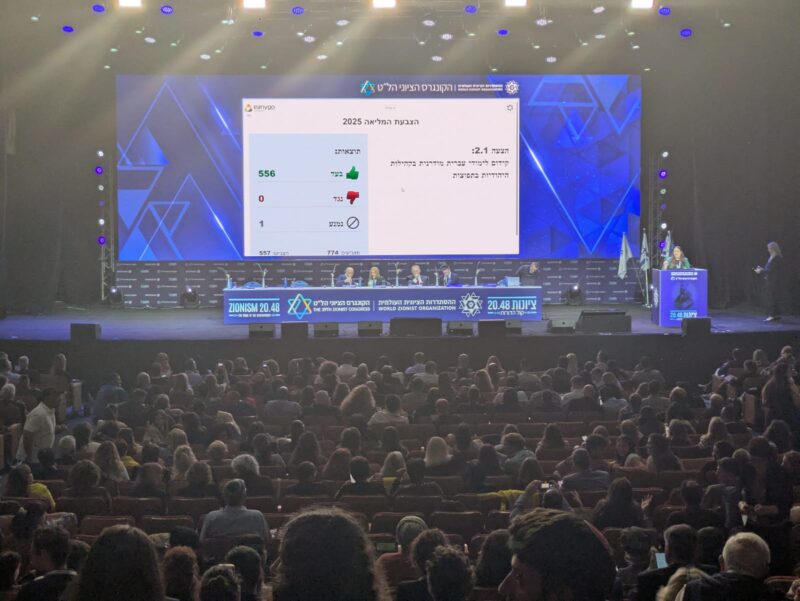
Judah Ari Gross/eJewishPhilanthropy
Delegates vote in the 39th World Zionist Congress in Jerusalem on Oct. 29, 2025.
A new proposal has been put forward to break through the impasse in the World Zionist Congress coalition talks, which have been stalled for nearly a week, those involved told eJewishPhilanthropy. The new arrangement would see an even split between the center-left and center-right blocs in the control of the World Zionist Organization and Keren Kayemeth LeIsrael-Jewish National Fund, though with some significant changes from the initial proposal regarding the specific leaders.
The main change to the new proposal concerns the leadership of the WZO, which runs education and civil projects in Israel and around the world. Under the initial plan, Rabbi Doron Perez, the chair of the religious Zionist World Mizrachi movement and the father of Capt. Daniel Perez, who was killed in the Oct. 7 attacks and whose remains were held captive by Hamas until last month, would have been named WZO chair for the first half of a five-year term, followed by a representative from the centrist Yesh Atid party.
Under the new agreement, which was tentatively reached in the predawn hours of Tuesday morning, WZO would instead be split between World Likud — with current WZO Chair Yaakov Hagoel serving in the role for the first half of the five-year term — followed by an as-yet-undecided Yesh Atid representative.
Perez would be appointed to another position within the so-called “National Institutions” — WZO, KKL-JNF, the Jewish Agency for Israel and the Keren Hayesod fundraising organization — either as president of the WZO, which is a largely ceremonial role, or as chair of Keren Hayesod, a WZO official from the center-left bloc told eJP on Tuesday.
Under the new arrangement, as under the original one, the chair of KKL-JNF, which owns more than 10% of the land of Israel and maintains an accordingly significant budget, would first be led by a representative of the centrist Yesh Atid Party. After two and a half years, control of the organization would pass to an as-yet-unnamed representative from World Likud.
The WZO official said this new arrangement had “broad support” with agreement on the fundamental power-sharing aspects, but still needed full approval. Which position Perez would accept was the primary sticking point, the official said.
Perez confirmed to eJP that a new proposal had been put forth but declined to comment further, saying he would only speak after an agreement has been signed, which he said was likely to happen within the next day.
The initial plan had received broad support from the center-left and center-right blocs, but the arrangement fell apart dramatically on Wednesday evening after Israeli Culture Minister Miki Zohar of the Likud Party, who negotiated on behalf of the center-right bloc, announced that he planned to name Israeli Prime Minister Benjamin Netanyahu’s divisive son, Yair, to a senior position within the WZO. For the center-left bloc, this was a nonstarter due to Yair Netanyahu’s extensive history of bellicose, often vulgar, remarks against his father’s political opponents, his close connection to far-right figures around the world and the fact that he remained living in the United States after the Oct. 7 terror attacks, while other Israeli expats returned to Israel to assist the country.
The new agreement would block Yair Netanyahu from obtaining a senior position at the WZO and also prevent the far-right Otzma Yehudit party from obtaining positions within the WZO — a major area of concern for the center-left bloc.
Unlike most political bodies, the World Zionist Congress is not designed as a “winner-take-all” organization, with a ruling coalition and an opposition. Instead, the congress allocates positions within the so-called National Institutions, largely based on the shares of seats that different factions have earned in the elections held every five years. In general, the leadership of the organizations goes to the larger faction, with lower-ranking positions going to the smaller one. Such was the case in 2020, when the Likud gained control of both the WZO and KKL-JNF.
Without an agreement on how to appoint the leaders of the National Institutions, the congress voted last Wednesday to extend itself by two weeks to leave more time for negotiations.
On Sunday morning, the center-left bloc put forward a new resolution that was aimed primarily at preventing Yair Netanyahu from receiving a senior position at the WZO. Voting opened on Sunday at 2 a.m. ET and was initially meant to run for 48 hours. The vote appeared likely to pass, according to multiple sources within the congress.
Perez, who would have been named WZO chair under the deal, along with other figures in the center-right bloc, came out against the resolution, warning that it would drive a wedge between the National Institutions and the Prime Minister’s Office.
To avoid this, negotiations continued on Monday night into the early hours of Tuesday morning, on the sidelines of the Jewish Agency for Israel Board of Governors meeting.
On Tuesday morning, as the new agreement was coming together, the vote was extended by another day to give center-right delegates, who had largely abstained from voting, a chance to cast a ballot in favor of it in order to move the process further, the WZO official told eJP.
The 39th World Zionist Congress opened last Tuesday. The main voting sessions for the congress were initially scheduled for Thursday, but they were moved up to Wednesday due to a large Haredi anti-enlistment protest that has also been scheduled for Thursday in Jerusalem, which would have made it difficult for delegates to arrive or leave Jerusalem’s International Convention Center, where the congress was held.
The initial agreement had represented a victory for the center-left camp, which was able to negotiate better terms, despite being slightly smaller than the center-right, due to a schism within the Likud, which leads the center-right coalition. This was made possible, in part, because of support from the non-elected Zionist institutions with voting rights who pushed back against an attempt by right-wing parties to take full control of the National Institutions.
The schism within the Likud centered around competition between two main camps within the party, one represented by Hagoel and one by Zohar, a close ally of the prime minister. Zohar had initially appeared to have won out, but the dissolution of the initial agreement reopened the power struggle, allowing Hagoel an opportunity to potentially return to the top post in the WZO.

 Add EJP on Google
Add EJP on Google




